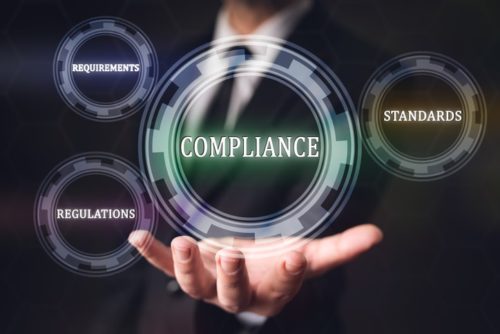What is ITAR Compliance?
Federal Export Laws
ITAR Compliance - What is it?
ITAR Compliance is a requirement for persons or organizations involved in the export or transfer of military articles and services. This includes the transfer of associated technical information.
The ITAR (International Traffic in Arms Regulations) and the EAR (Export Administration Regulations) are export control regulations run by different departments of the US Government. Both are in place to give the government a tool to ensure that restricted technologies do not get into the wrong hands. An export license may be required for both ITAR and EAR controlled items if the parties involved are non-US citizens or involve non-US charted corporations.

International Traffic in Arms Regulations
The more stringent of the two sets of regulations was written for articles that are developed for defense-related applications. Articles specifically designed or otherwise intended for military end-use are enumerated on the United States Munitions List (USML) or the Missile Technology Control Regime (MTCR) Annex and are therefore controlled by International Traffic in Arms Regulations (ITAR). The ITAR is administered by the Directorate of Defense Trade Controls (DDTC) at the U.S. Department of State (DoS). ITAR Restricted articles include products / systems, services, and information (technical data).
Significant Military Equipment (SME) articles are those which have “capacity for substantial military utility or capability” including tanks, high explosives, naval vessels, attack helicopters (and more) which are noted on the USML with an asterisk.
An export license is required to exchange technical emails, teach how to repair an ITAR restricted article and shipping the ITAR controlled item to a non-US Person (Foreign citizen or foreign chartered corporation) whether they are inside they United States or outside the United States.
All companies must self-classify their products and services in order to determine the degree of necessary control on restricted articles subject to the International Traffic in Arms Regulations (“ITAR”) per USC 22 CFR 120.6. ITAR Compliance requires the control of restricted technical articles by manufacturing, service providers, distributors, engineering companies as well as freight forwarders and brokers.
Furthermore, a Technical Assistance Agreement must be filed with the DDTC when a foreign person will be the recipient of a defense service. A TAA must be approved prior to the release of technical data or a restricted defense service to a foreign person. Technical data would include information on the design, development, engineering, manufacture, production, assembly, testing, repair, maintenance, modification, operation, demilitarization, destruction, processing or use of defense articles whether or not the technical data is electronic or printed.
ITAR Compliance Program
The DDTC requires that a company who has restricted articles or performed restricted services to control their company with procedures that meet ITAR requirements in accordance with the DDTC Compliance Program Guidelines.
EAR – Export Administration Regulations
All other items not specifically listed in the USML are controlled under the Export Administration Regulations (EAR), administered by the Bureau of Industry and Security (BIS) at the U.S. Department of Commerce (DoC). The Commerce Control List (CCL) lists items by category and each entry has its own Export Control Classification Number (ECCN). ECCNs include specific controls for Chemical & Biological Weapons, Nuclear Nonproliferation, National Security, Missile Technology, Regional Stability, Firearm Convention, Crime Control, and Anti-Terrorism.
The level of control depends on the nationality of the parties involved in the transaction, country being exported to, destination party, and end-use. In addition, there are “500 Series” and “600 Series” items that are more strictly controlled than the rest of the CCL, but less strictly controlled than the articles on the USML.
These “500 Series” and “600 Series” align with the international Wassenaar Arrangement on Export Controls for Conventional Arms and Dual-Use Goods and Technologies, a multilateral export control regime with 41 nation members, including the United States.
All companies must self-classify their products and services in order to determine the degree of necessary control on restricted articles as they are listed in the Commerce Control List (“CCL”) USC 15 CFR 736.2 (General prohibitions and determination of applicability) under the Export Administration Regulations (“EAR”). These regulations require the control of restricted technical articles by manufacturing, service providers, distributors, engineering companies as well as freight forwarders and brokers.
EAR Compliance Program
BIS requires that a company who has restricted articles or performed restricted services to control their company with procedures in accordance with the BIS Core Elements of an Effective Export Management and Compliance Program.
With our expertise, you will:
- Increase your compliance levels and make sure your company is prepared for an internal, customer or government audit.
- Empower your employees with an, easy-to-learn customized process integrated into your company’s quality management system, you and your staff gain complete control of ITAR and EAR restricted data and product.
- Have a compliant process and system to prevent ITAR violations that could result in criminal or civil penalties.
- Contact CVG Strategy today with your ITAR questions to see how we can help.
How Can We Help?
Take a look around our site and contact us for more information on how we can help you meet your challenges.
Latest News
Nicaragua Export Restrictions Increased by U.S.
Nicaragua export restrictions have been increased by both the Directorate of Defense Trade Controls (DDTC) and the Bureau of Industry and Security (BIS) as of


